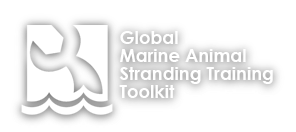Safety Best Practices
Human Safety
- NEVER put yourself in a dangerous situation
- Dress appropriately for the weather conditions
- Keep an eye on tides and weather as they change
- Be aware of environmental hazards
- Wear disposable gloves, safety glasses, a face mask if you are in a confined space with the animals or near the blow area
- Cover wounds with protective dressings
- Avoid contact with bodily fluids
- Wash exposed skin and clothing thoroughly
- Do not lean over the blowhole of exhaling animals
- Do not expose pets or other animals to potentially contaminated clothing or gear
- Do not consume food or beverages in the vicinity of stranded animals or at necropsy
- Children, ill or Immune-compromised individuals and pregnant women should avoid direct contact with marine mammals
- Adopt and use necropsy, husbandry and laboratory procedures that minimize the risk of cuts and injuries
- Seek immediate medical attention for injuries
Animal Safety

